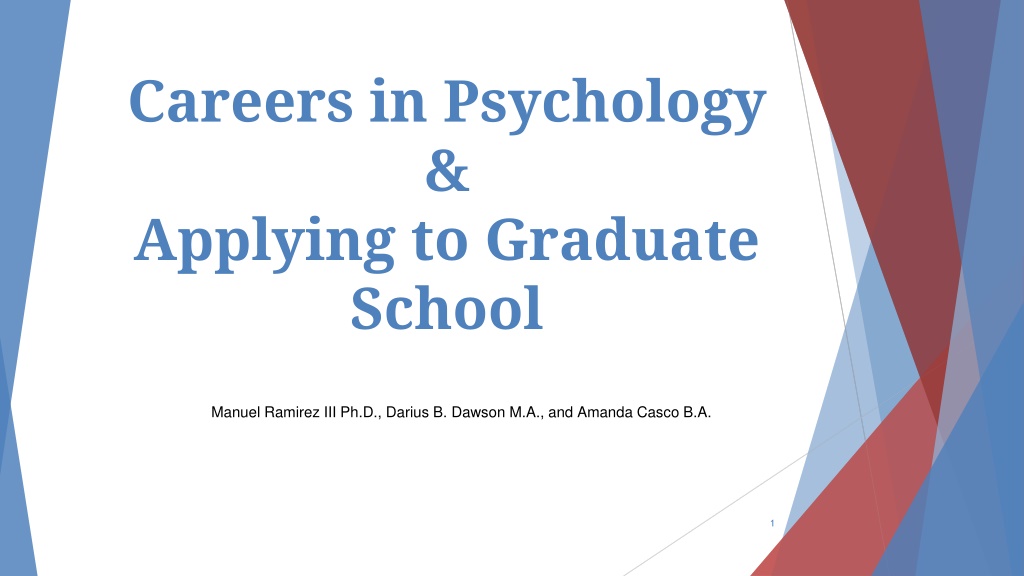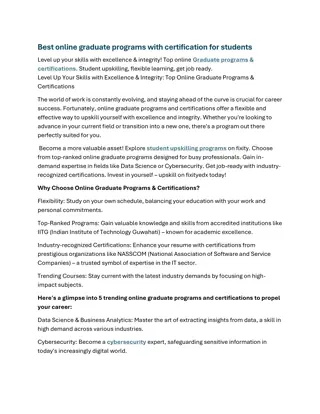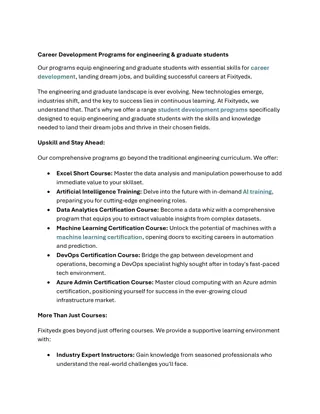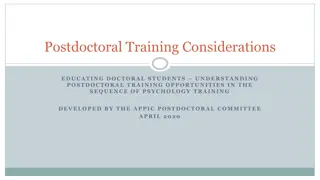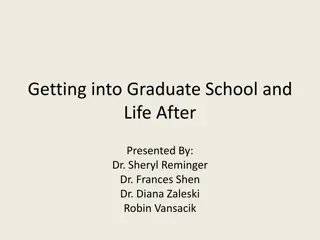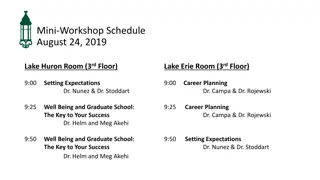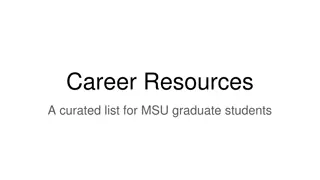Career Opportunities in Psychology and Applying to Graduate School
Explore the employment opportunities available with a Bachelor's degree in psychology, including positions like data analyst, career counselor, and marketing researcher. Learn about the various graduate school options in psychology, such as clinical, counseling, and school psychology programs. Discover the different helping professions and licensed areas in the field of psychology. Find out about careers in research and the diverse settings where research psychologists work.
Download Presentation

Please find below an Image/Link to download the presentation.
The content on the website is provided AS IS for your information and personal use only. It may not be sold, licensed, or shared on other websites without obtaining consent from the author. Download presentation by click this link. If you encounter any issues during the download, it is possible that the publisher has removed the file from their server.
E N D
Presentation Transcript
Careers in Psychology & Applying to Graduate School Manuel Ramirez III Ph.D., Darius B. Dawson M.A., and Amanda Casco B.A. 1
Table of Contents 4 18 Employment Opportunities for a Bachelor s Degree Applying to a Lab 19 Financial Assistance 6 The Different Helping Professions 20 Applying Now or Later 7 22 GPA Careers in Research 9 23 Letters of Recommendation Master s Degree 10 24 Research Experience Ph.D. or Psy D. ? GREs 25 The Different Areas of Graduate Study 12 Personal Statement 26 Counseling and Clinical Programs What happens if you don t get in? 13 27 School Psychology Timeline 14 28 Industrial/Organizational Psychology Additional Information to Consider 15 29 Terms to know 30 Psychiatry 16
What can you do with your degree now that you ve graduated? 3
Employment Opportunities For A Bachelor s Degree You can work in a variety of positions with a Bachelor s Degree. You can work in areas such as an employment counselor, personal analyst, probation officer, etc. However, you may also find yourself working in advertising, research, or state department health and human services. Possible Work Settings: Possible Positions: Data analyst Case management specialist Career counselor Psychiatric technician Marketing researcher Psychology teacher at the high school level (but keep in mind many states also require a teaching certificate) Vocational rehabilitation clinics Correctional institutions Mental health facilities 4
The Different Helping Professions Allied Areas: Types of Graduate Degrees in Psychology: Licensed Marriage and Family Counselor-MA Licensed Professional Counselor (Life Crisis Counseling)-MA Clinical - MA, Ph.D., PsyD Counseling - MA, Ph.D. School - MA, Ph.D. Industrial/ Organizational - Ph.D., Human Engineering - Ph.D. Community - Ph.D. Neuropsychology - Ph.D. Psychological Associate - MA Licensed Chemical Dependency Counselor-BA Social Work-BSW, MSW, Ph.D. Psychiatric Nursing-Ph.D. Licenses in Psychological Practice: Psychiatry-M.D. Psychology (Ph.D. in Clinical, Counseling, or School) Psychiatry (M.D.) Social Work (LCSW, Ph.D.) Licensed Professional Counselor Licensed Marriage & Family Therapist Licensed Chemical Dependency Counselor 6
Careers in Research Employment in Research Labs Research Labs in Psychology Departments Independent Research Labs Education Testing Service Stanford Research Institute Battelle Research Institute US Government Research Labs Public Health Service National Institutes of Mental Health US Department of Defense Labs Consumer Products Industry Market Research 7
Different Degrees Slides 8 to 10 breaks down the different degrees that you can pursue in graduate school. The degree you pursue is dependent on the following: How much time and money do you want to spend on graduate school? What do you want to be able to do in your career? Which degree fits best with your career interests? 8
Masters Degree In a Master s program, one trains to become a psychology professional. A psychology professional will consider how to apply the principles of psychology to solve specific problems that their client may have. Choosing which type of Master s degree you want will help you prepare for which area you want to work in. Degrees include: Clinical Social Work Marriage and Family Therapy Mental Health Counseling School Counseling After obtaining a Master s degree you can get licensed to become a therapist. Requirements vary from state to state, so it s important to find out what you need to qualify for licensure. Potential licenses include: Licensed Clinical Social Worker (LCSW) Licensed Marriage and Family Therapist (LMFT) Licensed Professional Clinical Counselor (LPC or LPCC) 9
Ph.D. or Psy D. ? According to the American Psychological Association: The PhD is generally regarded as a research degree. Although many professional psychology programs award the PhD degree especially those in university academic departments these programs typically have a greater emphasis on producing new knowledge and engaging in research. A Ph.D. can open doors for you to pursue a career in research and/or academia. The Psy D. is a professional degree in psychology generally offered by private schools. Programs conferring the PsyD degree focus heavily on the application of psychological science to provide a service to individuals or groups. Psy D. programs generally have much less of an emphasis on research than Ph.D. programs. 10
What Area of Psychology Interests You? Slides 11 to 15 will explore some of the areas of psychology that you can consider for graduate school. Think about: Which of these areas align with your interests and skills? What population of people do you want to work with and in what context? How much time do you want to invest in your degree? 11
The Different Areas of Graduate Study There are several types of graduate programs in Psychology. Some of these areas are: Developmental, Social and Personality, Biopsychology, Cognitive, Behavioral Neuroscience, Cognitive Neuroscience, Clinical, Counseling, Perception Brain & Behavior, School, and Industrial-Organizational (I- O) Psychology There are also other types of graduate programs related to the field of psychology For example, UT Austin s School of Human Ecology contains a Department of Human Development and Family Sciences. They emphasize research, teaching, and training in individual development and relationship processes. 12
Counseling and Clinical Programs (approx. 6-7 years for Ph.D., Ed.D., Psy.D.; 2-3 years for Master s degree) Similarities Differences Counseling and Clinical Programs tend to be more similar than different. However, Clinical Programs may place more emphasis on psychopathology training and external practicum opportunities - R. Morgan and L. Cohen, APA.org Counseling Programs may allow for more coursework and training flexibility within the program. Clinical practice Diagnostic assessment Individual, family, and group counseling Academia (research and teaching) "Find the people you're most interested in working with and don't worry about whether they're counseling or clinical. 13
School Psychology (approx. 6-7 years for Ph.D., Ed.D., Psy.D.; 2-3 years for Master s degree) The school psychology program at UT Austin follows a science-practitioner model to "prepare PhD psychologists to understand and enhance the development of children and adolescents in context. This Program includes training in the foundations of psychology, research, the practice of competency and ethics in the application of assessment, intervention, and consultation. School psychologists provide important services in these systems including assessment and diagnosis of behavioral and learning problems of students; implementation of therapeutic interventions; and consultation with families, administrators, and teachers. 14
Industrial/Organizational Psychology (Master s 2-3 years, Ph.D., Psy.D 6-7 years) I-O psychologists work in business doing psychological assessments, testing, interpersonal mediation, group dynamic assessments, and workshops (on stress, depression, communication skills, etc.) * There are a variety of fields within I-O psychology such as testing/assessment, leadership development, staffing, management, teams, compensation, workplace safety, diversity, and work-life balance. *Graduate School & Careers in Psychology. (n.d.). Retrieved September 27, 2016, from http://psych.wisc.edu/newman/Pages/Graduate%20School%20&%20Careers%20in%20Psychology.htm 15
PSYCHIATRY (M.D., minimum. 3-4 years of training after Medical School; full time) Psychiatrists tend to work in hospitals, clinics, and private practice. They usually work with patients who requre psychiatric medication and can also provide psychotherapy. According to the American Psychiatric Association, after completing medical school and taking a written exam for a state license in the practice of medicine, one would pursue a minimum four year residency for psychiatry. During this residency, one spends time learning the diagnosis and treatment of mental health, including various forms of psychotherapy and the use of psychiatric medications and other treatments. Training takes place in in-patient, out-patient, and emergency room settings. 16
Choosing the Right Graduate School Slides 17 to 19 contains information that you may want to consider when looking at graduate schools. What are your research interests? What population do you want to work with? Do the graduate schools you are applying to have what you need in a program for both your academic growth and your immediate needs? 17
Applying to a Lab Very often, when you apply to graduate schools, you may be applying to a lab rather than the school as a whole. When professors chose graduate applicants to work in their lab, they look for people whose research interests are similar to their own and who have worked with similar populations. Keep this in mind when choosing which labs you want to apply to. One way to get to know these professors is by reading their published works as well as their current research interests. Use your university s library database to check out what their interests are. Additionally, the programs you are applying to should have a short bio about them, information about their lab, and their CV. 18
FINANCIAL ASSISTANCE Consider what kind of financial assistance the graduate program is able to provide for you. One form of support is a research assistantship, which pays you to help conduct research for a professor or a lab. Another is a teaching assistantship, which pays you to help a professor teach a course. You might also receive fellowships or grants through your lab, psychology department, or university. These fellowships vary in amount and time they are available. Again, your university should have this information available online. Some universities only supply these forms of financial support for a specific amount of time or after certain requirements are met. It s important to know the different ways you can support yourself financially, so that you can plan accordingly. Keep in mind that cost of living varies city-to-city. Do research on how much you need to budget for rent, food, commute, ect. If you have the chance, talk to grad students in the area to get an estimate of what to expect. 19
APPLYING NOW OR LATER? A lot of students apply to graduate school right after they graduate. If you feel that you will lose motivation or direction after taking time off, then applying immediately could be best for you. However, if you need to take time off before applying you can do that. Spend getting more psychology-related experience. Working in a lab doing research would be an asset to your application and show that you are a motivated individual. It is important that you stay involved in psychology-related jobs/activities. A gap year without any purpose could hurt your chances. Another thing to consider is that the quicker you apply, the more relevant your letters of recommendation will stay. 20
What do grad schools look for? Slides 21 to 25 covers the different documents and activities that graduate schools use to determine your eligibility for their program. What have you done so far that demonstrates your abilities and talents in psychology? What can you do in the future that increases your eligibility for your desired program? Which of these things can you work on in the timeline that you have? 21
Applying to Graduate School (GPA) Grade point average is an important aspect of your application. The higher your GPA, the better your chances of getting in to graduate school. Very competitive programs may look for GPAs at 3.5 or higher and many may not consider anyone under that GPA. If you have an explanation for a low GPA (such as trouble adjusting, a personal crisis, one bad class, etc.) consider mentioning it in your statement of purpose. Additionally, mention how you overcame that obstacle, and why it won t be an issue in the future. However, be careful not to spend too much time or space on this. Upper division GPA and psychology course GPA is usually more important than lower division GPA. 22
Applying to Graduate School (Letters of Recommendation) Obtain a minimum of 3 letters from psychology professors. Get involved in a research lab. Letters from faculty research advisors can be great assets to your application. Form relationships with faculty. The more they get to know you, the more potential the letter has to be authentic and convincing. When you ask a professor to write a letter for you, make it easier for them to write the letter you want by giving them relevant information about yourself, courses that you took, your grades, and any activities you participated that are relevant to the programs you are applying to. 23
Applying to Graduate School (Research Experience) Being involved in research labs is a great benefit to your application. The applied skills and experience that you gain from a lab may not be something that you can gain from a normal course. Ask a professor that you ve previously had a course with if you can volunteer in their lab. The best labs to work in are those whose research interests align with your own. If you are unsure of what specific research area you re interested in, make sure to look into several labs until you can find the one that feels right for you. Psychology departments will have a list of available labs on their websites. 24
Applying to Graduate School (GREs) Most graduate schools will require you to take the Graduate Record Exam. The GREs consist of three sections: verbal, quantitative reasoning (math), and analytical writing (which measures abstract thinking). Some schools, but not all, may also require you to take the "advanced" portion of the test in psychology. So check to see if this is required for the schools you re interested in. Graduate schools are required to provide information about the GRE scores of past graduate students. Prepare for it. The best way to prepare for the GRE is to get comfortable with it. Knowing what will be on the test and what strategies to use is essential. You can buy books that break down the GRE and include practice tests. If studying on your own doesn t seem like enough, there are also classes you can take for the GRE. These can be a little pricey, so check to see if your university offers a discount rate or free classes. ETS also offers free prep services on their website that includes samples of past GRE questions. 25
Applying to Graduate School (Personal Statement) Your personal statement gives you the chance to show off who you are and what makes you an asset to the programs you are applying to. Highlight the accomplishments and skills that show you will do well in their program? Include the interests you have that align with their program, and how you plan to use your experience there for your future. Make sure to have some faculty members from the program in mind. You will need to mention which lab(s) you would like to work in and why it aligns with your research interests. This is a great time to mention relevant past lab experience to show that you already have some training. Avoid making general statements and try to be as specific as possible. Ex: SOP 1 SOP 2 26
What happens if you dont get in? Doctoral programs in Psychology are very competitive and can receive hundreds of applications. Because of this, many applicants are denied admission or deferred to a waiting list. In fact, many applicants have only been admitted after their second or third attempt. If you find yourself in this situation, and want to apply again, it s important to come up with a strategy that you can use for the following year. 1) Look over your application and begin an honest assessment of its weaknesses and strengths. Are there places where you could improve your application before the next year? If so, come up with a plan and reasonable timeline for strengthening weak areas and highlighting strong areas. 2) Look at the programs you applied to. With so many applicants, programs can afford to be very picky. It s important that you increase your chances of acceptance by selecting schools that are a good fit and will find your application attractive. Some issues to think about are the following: how well your research interests align with the program, what are the credentials/experience of the applicants they ve accepted in the past, and assess how well you conveyed your overall fit to the program 3) Keep your research experience, Statement of Purpose, letters of recommendation, and GRE scores up to date. Consult with the professors who have recommended you. 27
TIMELINE If you intend to go to graduate school right after you finish your undergraduate work, here's a rough timetable for preparing your applications: Spring semester or before your junior year: Think about what type of program interests you Start communicating with faculty Get involved in research or an independent study project Fall semester of your senior year: Email graduate coordinators to receive information about the schools you re interested in Email the faculty that you are interested in working with to be sure he/she is accepting a student Take the GRE before October Summer before your senior year: Read through Graduate Study in Psychology Ask professors to write recommendation letters as early as September Make a rough list of schools you might apply to Start writing your personal statement **Make sure to check when your applications are due; deadlines vary by school and program Begin studying for the GREs/Take GREs After the fall semester: Await acceptances or interview offers 28
Additional Information to Consider If you are a minority student, you can consult the Minority Fellowship Program of the American Psychological Association to identify schools that have a diverse graduate student body. Some schools have minority graduate student associations that you can contact for information about the campus and general advice for applying. If your interest in Psychology focuses on Minority and/or Diversity Studies, contact a faculty member who can give you recommendations on schools that have a lab with a diversity focus. 29
Terms to Know Academia: the environment or community concerned with the pursuit of research, teaching, and scholarship ("Academia." Merriam-Webster.com. Merriam-Webster, n.d. Web. 06 May 2017.) Clinical Practice: providing diagnostic-psychological assessment, psychotherapy, and prevention in mental health; as well as consultant work with corporations and other institutions. Science-Practitioner Model: a training model sponsored by the APA that encourages training of psychologists in research skills and in provision of mental health services. 30
The Multicultural Lab at UT Austin Website UT Multicultural Lab 31
